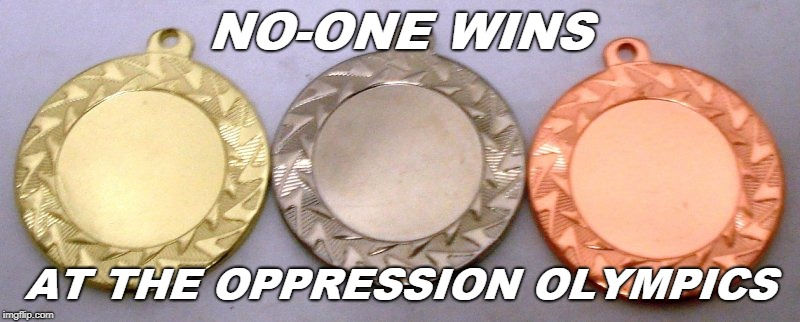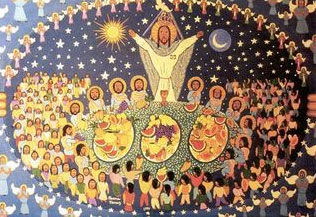"Check Your Privilege" - Jesus
- Rev. Dr. Susan Strouse

- Sep 1, 2019
- 9 min read

These Are Not Ordinary Times We’re now half-way through the long season after Pentecost. It’s also sometimes called Ordinary Time, but I’ve never been fond of that designation.“Ordinary” refers to the fact that there are no major holy days, like Christmas or Easter or distinctive seasons like Advent or Lent in this almost 6-month stretch. But it is distinctive in that it’s a season of attention to and growth in our discipleship. This year’s cycle of readings has been taking us through key passages in the Gospel according to Luke.
And frankly, it hasn’t been an easy journey. This business of following Jesus has some interesting twists and turns. Remember how in one story he calls to a prospective disciple, "Follow me." But when the person says, "Let me first go and bury my father," Jesus says, "Let the dead bury the dead."And the time he says, “Do you think I’ve come to bring peace to the earth? No, not peace, but division!”
Then there are the parables, The Good Samaritan and The Rich Fool – these seemingly simple stories that take everyday situations and ordinary people and then turn them upside-down and us inside-out, challenging us to look at ourselves and our world through the lens of the realm of God – which is not always a comfortable thing to do.
So, I submit that this season is not ordinary at all. We hear the message of the gospel to "comfort the afflicted and afflict the comfortable" and apply it to each new situation in our lives. Because, while the gospel stays the same, we don’t. Midway through this “After-Pentecost” season, perhaps it is a good time to take inventory of how we’re doing, how we’re taking in the values of the realm of God, and how we’re translating those values into our daily lives.
I find this particularly important this year. In the midst of division, increasingly dire social ills, and discouragement about how to fix them, it’s imperative for us to look at all of it through the lens of the realm of God. In doing so, we can find not only comfort, but also the challenge that Jesus has for us to continually learn and grow into our best selves.
The Dinner Party So, here we are with today’s reading, in which we learn about a dinner party to which Jesus has been invited. In Luke’s gospel, this is the third time he’s on the guest list for an event hosted by a local religious leader. This tells us that Jesus had achieved some notoriety; he was on the A-list of people you wanted at your soiree. But it also becomes clear that another reason to invite him was to keep an eye on him.
The story of this dinner party has two parts. The first part is a warning against asserting privilege. The second part is about our responsibility to extend hospitality to those who can’t reciprocate. Both of these are certainly relevant to us today.
In today’s language, Jesus might have said to the guests, “You need to check your privilege at the door.” This might give us some idea of how offended his fellow guests would have been. “Check your privilege” has become a kind of a combative statement meaning “get-with-it” - get with the idea that society grants unearned rewards to people based on things like race, gender, class, sexuality, body type, physical ability, etc. Checking your privilege means acknowledging how these rewards benefit your life.

For example, when I was at First United in San Francisco, I was part of the Extraordinary Lutheran Ministries (ELM) roster of clergy, even though I’m not LGBT. But because I was pastor of a congregation that had been expelled nine years previously for calling an out gay pastor, I was included. But at retreats and other gatherings, I was very aware of my privilege as a straight pastor. I didn’t have the same difficulties with synod candidacy committees, congregational call committees (although I could relate in some ways as a female pastor when that was still an issue for many congregations). So even though I was encouraged to participate in discussions, I did so very carefully. As I once explained to them, “I’m kind of like a man at a feminist convention.” Checking my privilege meant acknowledging how being straight benefits my life.
Now, no one likes being called out for unchecked privilege. Another example: I was recently called out by someone responding to our invitation to participate in civil discourse across the red/blue divide. The writer said, “I’m sorry, but this idea--to me--reeks of privilege. No one whose life is actually impacted by this stuff could even contemplate indulging in some kind of 'listening' session with (these) people.” I disagree with that assessment, but I did have to take a moment and make sure that I was not responding just out of defensive and anger (which I was), but also taking a serious inventory of my motives and how I communicated them.
As is the way of human beings, we’ve taken a good idea too far. These days, you’ll hear all kinds of people accusing others of basking in their unchecked privilege. So, although we seem to have created an Oppression Olympics, a competition to determine who has the least amount of privilege and we’ve even weaponized the word ‘privilege,’ it’s still important to examine how and where and why we’re the ones who naturally get a place of honor at the banquet table – and to be aware of who does not.

A way to extricate ourselves from the combativeness of the Oppression Olympics and its companion “what-about-ism” is the concept of intersectionality, which refers to the ways in which various forms of discrimination linked to aspects of a person’s identity, overlap or intersect. For example, I have a friend who was struggling with the concept of white privilege. She is white; she’s also a lesbian. Her argument, actually a form of what-about-ism, was that she’d been oppressed, too, for being both female and gay. And she was right. But it doesn’t take away from the fact that she enjoys privileges people of color do not, especially LGBT people of color. The fact is that we can be privileged in one aspect of our identities and not in another. I’m happy to say that this approach is part of the ELCA’s new social statement: Faith, Sexism, and Justice. It can help us avoid these traps, while freeing us to live humbly and inclusively, as Jesus described in his advice to his dinner companions.
Dear Church I’ve been reading the book Dear Church: A Love Letter from a Black Preacher to the Whitest Denomination in the US by Lenny Duncan, an ELCA pastor. It’s a really good book. One of the things I like about it is that he calls it a love letter. He’s critical of the church, yet he’s in love with the church. He calls us out, but he also calls us in – into a bold new vision for the ELCA and the broader Christian community. He rejects the narrative of church decline and calls us all to be part of the church that rises up, dusts itself off, and takes on forces of this world that act against God, such as white supremacy, misogyny, nationalism, homophobia, and economic injustice. He urges us to follow on the path of Jesus to turn the values of the world upside down and inside out.

It’s no wonder the religious establishment was watching Jesus. We don’t how they reacted when he called them out. Maybe they laughed in discomfort, or shook their heads in disbelief, or questioned his sanity. Maybe they argued back. Maybe they agreed with him and promised to follow his advice from then on. We can’t know how they reacted.
All we can know is how we react to the story and its implications. I can tell you how I feel when called out: at first, defensive (“Yeah, well, what about my ______?) and angry; then maybe embarrassed, ashamed. If I’m able to be self-aware enough to take a breath and consider whether there’s any truth to the accusation, I just might be open to a transformational moment.
Right now, the church is all over that continuum. I read a lot of social media from church members who are exhibiting defensiveness, what-about-ism, and anger. Others are recognizing the part we’ve played in the oppression of others. For example:
Our ELCA Churchwide Assembly voted overwhelmingly to approve Faith, Sexism, and Justice, which, in part, names patriarchy and sexism as sins and calls the church to make a public statement of repentance and establish a day of confession and repentance for these sins.
In a "Declaration to People of African Descent," the ELCA apologized for its historical complicity in slavery and its enduring legacy of racism in the United States and globally. The document was presented to the Rev. Lamont Wells, president of the African Descent Lutheran Association.
The Assembly also adopted a resolution to condemn white supremacy, calling all congregations to engage in a "study of the structures and rhetoric that empower and fuel racism and white supremacy and to take to heart the teaching of Scriptures, so we may all be better equipped to speak boldly about the equal dignity of all persons in the eyes of God."
I really like that last statement. I believe that was what Jesus was getting at in this story. Those other dinner guests had to interpret it for their time, and so do we. The question is whether or not we’ll actually follow through on these actions and resolutions. There is some skepticism about this, which I hope will be proven wrong. We’re hovering between the phase of embarrassment and shame for past sins and self-awareness of knowing the truth. It remains to be seen if this will be a transformational moment for the church.
For now we can each ask ourselves these questions: Where in my life, church, community, and nation do I see evidence of people asserting their privileged status in ways that create injustice? And going even deeper: how do I recognize my privilege?
In the second part of the story: Jesus tells his host that his future guest list should include those who would never be able to reciprocate. And he should invite people of all kinds, including those of lower social classes, those who are poor, those physically challenged, all of the marginalized.
This is the work order of the church!
The questions here are: What other forms, beyond table fellowship, does hospitality take today? Where in my life, church, community, and nation do I see people extending hospitality only to those who can reciprocate? Who’s left out? What can I do to extend hospitality to them?
In Dear Church, Pastor Lenny Duncan writes: “You want to know why young people are pouring out of our churches and finding sustenance elsewhere? Because we claim to be a community founded on the incredible vision of the heavenly banquet, yet we don’t even have enough chairs for everyone to sit at the table. We love the hymn All Are Welcome, but it should come with an asterix and we know it.”
His words make me uncomfortable. They should make all of us uncomfortable. But he advises us to take a breath: “Let’s sit in that moment a bit longer, Church, and allow the discomfort to fuel our work.”
Nobody ever said discipleship was going to be easy. Back then, the authorities were watching Jesus, laying traps at every turn. It was a difficult time to be a disciple. Today, we do our work in the midst of division, increasingly dire social ills, and discouragement about how to fix them. As it has always been, but it bears repeating: it is imperative that we look at all of it through the lens of the realm of God. Because in doing so, we can find not only comfort, but also the challenge that Jesus has for us to continually learn and grow into our best selves. And together make our church its best self, too.
Amen

Luke 14:1, 7-14 Jesus’ words regarding banquet guests are also applicable to our time. Jesus calls us to mindfulness and humility. We are part of a larger whole in which others matter just as much as we do, and that includes (in God’s eyes) other nations. Those who are confident in God’s grace can advocate for their positions and affirm their value and place in the church and society without diminishing others.
It is written . . .
One sabbath, when Jesus came to eat a meal in the house of a leading Pharisee, the guests watched him closely. Jesus went on to address a parable to the guests, noticing how they were trying to get a place of honor at the table.
"When you’re invited to a wedding party, don’t sit in the place of honor, in case someone more distinguished has been invited. Otherwise the hosts might come and say to you, ‘Make room for this person,' and you would have to proceed shamefully to the lowest place. What you should do is go and sit in the lowest place, so that when your hosts approach you, they'll say, ‘My friend, come up higher.’ This will win you the esteem of the other guests. For all who exalt themselves will be humbled, and those who humble themselves will be exalted."
Then Jesus said to the host, “Whenever you give a lunch or dinner, don’t invite your friends or colleagues or relatives or wealthy neighbors. They might invite you in return, and thus repay you. No, when you have a reception, invite those who are poor or have physical infirmities or are blind. You should be pleased that they can’t repay you, for you will be repaid at the resurrection of the just."






Comments